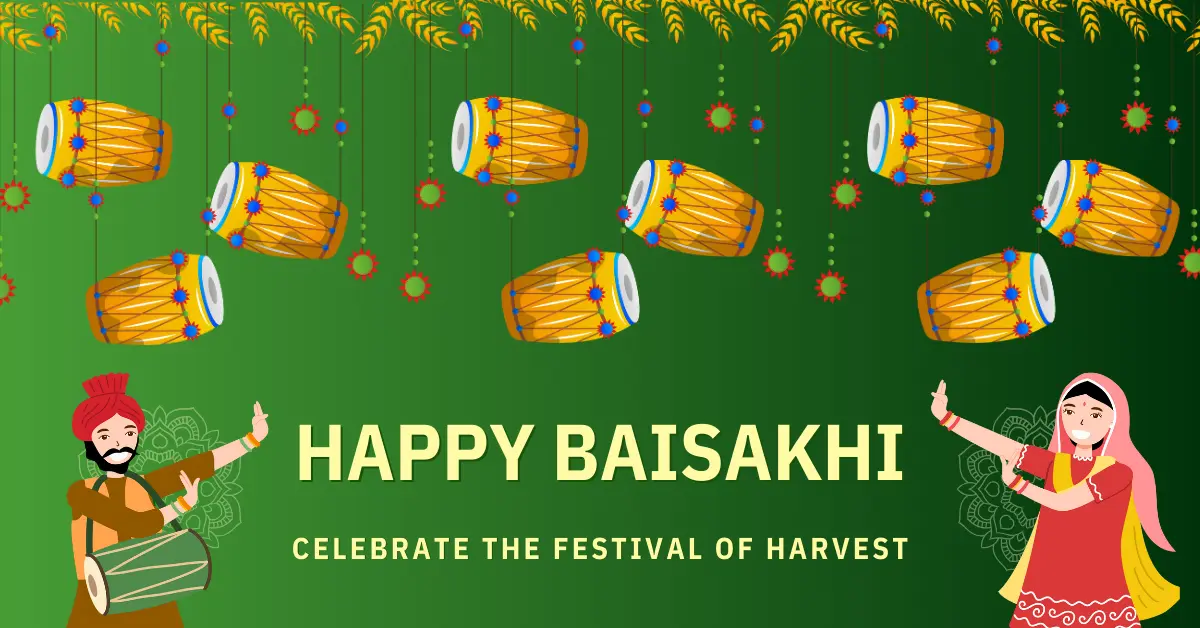Discover the rich history and vibrant traditions of the Baisakhi festival celebrated on April 13, 2024. Explore the celebrations, rituals, and cultural significance of this important Sikh and Punjabi holiday.
Introduction
Baisakhi 2024: Embracing the Spirit of Renewal and Harvest

One of the biggest celebrations in the calendars of the Sikhs and Punjabis, Baisakhi, will be in the air as the sun rises on April 14, 2024. Baisakhi, which ushers in the harvest season and the solar new year, is a festival of unification of culture and festivity.
As communities throughout India and the world unite to celebrate their history and welcome the prospect of a prosperous new year, Baisakhi this year looks to be an especially happy occasion. Whether you’re an experienced Baisakhi celebrator or brand-new to the occasion, this book will help you learn about the rich customs, colorful festivities, and cultural relevance of Baisakhi 2024.
The Historical Significance of Baisakhi 2024
Having its origins in the 17th century with the establishment of the Khalsa, the society of initiated Sikhs, Baisakhi is deeply significant historically. Tenth Sikh Guru Gobind Singh founded the Khalsa and called the first five members, known as the Panj Pyare or “Five Beloved Ones,” on Baisakhi Day in 1699.
With the Khalsa acting as its collective spiritual and temporal authority, this historic occasion signaled the departure of Sikhism as a separate religion. The Khalsa’s foundation strengthened the Sikh dedication to justice, equality, and the protection of the downtrodden and vulnerable.
Beyond its religious meaning, Baisakhi marks the beginning of the spring harvest season. Baisakhi was traditionally the conclusion of the rabi crop season and the start of a new agricultural cycle for farmers on the Indian subcontinent. Part of the Baisakhi celebrations even now is this link to the land and the natural cycles.
Vibrant Baisakhi Celebrations and Traditions

As Baisakhi 2024 approaches, communities across India and the global Sikh diaspora will come together to celebrate this vibrant festival. Here are some of the key traditions and celebrations you can expect to see:
- Nagar Kirtan Processions: A magnificent processional that circles through the streets of towns and cities, the Nagar Kirtan is one of the most recognizable Baisakhi customs. Sikh scriptures are read aloud, traditional instruments are played, and Sikh symbols and regalia are shown throughout these vibrant parades.
- Kirtans and Prayers: Gurdwaras, or Sikh temples, will hold special Baisakhi kirtans, or devotional music performances, prayer services, and readings from the Guru Granth Sahib, the Sikh holy scripture
- Community Feasts and Langar: Without sharing a communal lunch, or Langar, no Baisakhi celebration would be complete. Everyone is welcome to take part in this manifestation of equality and community as Punjabi food will be served in gurdwaras and community centers.
- Bhangra and Giddha Dances: Baisakhi celebrations will feature the colorful folk dances of Punjab, Bhangra and Giddha. These vibrant shows highlight the rich cultural legacy of the area while traditional music plays.
- Fireworks and Light Displays: The night sky will come alive with brilliant fireworks displays and the glow of lamps and candles as the sun sets on Baisakhi, adding to the joyous mood.
- Baisakhi Fairs and Melas: Local craftspeople, food vendors, carnival rides and other entertainment will be available at many communities’ Baisakhi fairs, or melas.
You will be sure to encounter the rich cultural tapestry of this significant event whether you take part in a Langar community feast, a huge Nagar Kirtan procession, or just the lively energy of a Baisakhi mela.
The Significance of Baisakhi in Sikh and Punjabi Cultures
Deeply important in Punjabi and Sikh cultures, Baisakhi is a festival of agricultural and spiritual rebirth.
Baisakhi, for Sikhs, commemorates the establishment of the Khalsa, a turning point in their religious history. Since the Khalsa’s founding confirmed Sikhism’s dedication to justice, equality, and service, Baisakhi is a celebration of Sikh identity and ideals.
The relationship of Baisakhi to the harvest season emphasizes in the Punjabi setting the significance of agriculture and the land in the local cultural fabric. Vibrant celebrations like Bhangra and Giddha dances at the festival also capture the rich folk customs and strong feeling of community that are essential to Punjabi culture.
FAQs
Is Baisakhi and Vaisakhi the same?
Yes, Baisakhi and Vaisakhi refer to the same festival. The terms are used interchangeably to describe the same celebration. Baisakhi and Vaisakhi both refer to the festival celebrated on the 1st of Vaisakh, the first month of the solar calendar used in parts of the Indian subcontinent. The terms are derived from the name of the month “Vaisakh” and are used synonymously.
When is Baisakhi celebrated in 2024?
Baisakhi will be celebrated on April 13, 2024. This date is significant as it falls on the first day of the solar new year.
How do Sikhs and Punjabis celebrate Baisakhi 2024?
For the Sikh community, Baisakhi celebrates the founding of the Khalsa and is a time to reflect on their faith’s principles of justice, equality and service. In Punjabi culture, Baisakhi marks the harvest season and is celebrated through music, dance and community gatherings.
coclusion
As the world emerges from the challenges of recent years, the Baisakhi 2024 festival of promises to be a time of renewed hope, celebration, and cultural unity. Whether you’re of Sikh or Punjabi heritage, or simply looking to immerse yourself in a vibrant cultural experience, Baisakhi 2024 offers a unique opportunity to connect with the past, embrace the present, and look forward to a bountiful future.
So mark your calendars, plan your journey, and get ready to be part of the colorful, joyous, and spiritually uplifting celebrations that will define Baisakhi 2024.
Happy Baisakhi!

2 thoughts on “Baisakhi 2024: A Guide to Traditions, Celebrations”